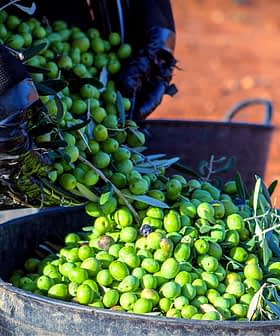Plant-Based Diets Can Combat Climate Change, Report Finds
Better land management practices combined with plant-based diets are effective in tackling climate change and mitigating its effects.
 Switching to a plant-based diet could help prevent desertification, scientists say
Switching to a plant-based diet could help prevent desertification, scientists sayThe Intergovernmental Panel on Climate Change (IPCC) report emphasizes the importance of better global land management and a shift towards plant-based diets to combat climate change. The study, prepared by experts from 52 countries, explores how land use contributes to climate change and the impact of climate change on food security, presenting sustainable land management practices and dietary changes as key solutions to reducing greenhouse gas emissions and addressing climate change. The report highlights the potential of these changes to not only mitigate climate change but also have positive socio-economic effects, providing scientific inputs for upcoming climate conferences.
A new report by the Intergovernmental Panel on Climate Change (IPPC) highlights better global land management and a move towards plant-based diets as effective ways to combat climate change.
The IPPC’s in-depth study, “Climate Change and Land,” was prepared by an international team of 107 experts from 52 countries and explores how land use contributes to climate change while also examining the effects of climate change on land and food security. This was the first and most comprehensive study of the global land-climate system. The IPPC is the United Nations body charged with assessing science related to climate change.
Balanced diets featuring plant-based foods, such as coarse grains, legumes, fruits and vegetables, and animal-sourced food produced sustainably in low greenhouse gas emission systems, present major opportunities for adaptation to and limiting climate change.
The main message of the comprehensive report is that in order to reduce greenhouse gases in a significant way and keep climate change in check, changes are needed in global land use, agriculture and dietary habits.
It describes land as a critical resource that must remain productive to ensure food security. When agricultural land loses its productivity, this results in soil degradation, erosion, and eventually desertification. Such land cannot absorb carbon and contributes to climate change while having a negative effect on food security.
See Also:Climate Change News“Land plays an important role in the climate system,” said Jim Skea, one of the report’s authors and co-chair of the IPCC’s Working Group III, which examines the mitigation of climate change. “Agriculture, forestry and other types of land use account for 23 percent of human greenhouse gas emissions. At the same time natural land processes absorb carbon dioxide equivalent to almost a third of carbon dioxide emissions from fossil fuels and industry.”
The threat of soil degradation and erosion can be addressed through sustainable land management. Some of the measures suggested in the study include the cultivation of green manure crops and cover crops, crop residue retention, reduced or zero tillage and improved grazing practices to preserve ground cover. Meanwhile other sustainable agricultural practices deemed to be beneficial to the preservation of land, include agroecology and agroforestry, conservation agriculture, crop diversity, crop rotation, organic farming, the preservation of pollinators, and rainwater harvesting.
“The choices we make about sustainable land management can help reduce and in some cases reverse these adverse impacts,” said Kiyoto Tanabe, one of the experts and co-chair of the IPCC task force on national greenhouse gas inventories. “In a future with more intensive rainfall the risk of soil erosion on croplands increases, and sustainable land management is a way to protect communities from the detrimental impacts of this soil erosion and landslides. However there are limits to what can be done, so in other cases degradation might be irreversible.”
“There is real potential here through more sustainable land use, reducing over-consumption and waste of food, eliminating the clearing and burning of forests, preventing over-harvesting of fuelwood, and reducing greenhouse gas emissions, thus helping to address land-related climate change issues,” added Panmao Zhai, co-chair of IPCC Working Group I, which looks at the physical science of climate change.
But better land management is not the only solution to tackling climate change and mitigating its effects. The IPCC experts suggest that a reduction in resource-heavy meat consumption and an increased uptake of plant-based diets could free up land and reduce CO2 emissions by up to eight billion metric tons per year by 2050.
Debra Roberts, co-chair of the IPCC Working Group II, charged with assessing the vulnerability of socio-economic and natural systems to climate change, confirmed that diet has a significant effect on climate change
“Some dietary choices require more land and water, and cause more emissions of heat-trapping gases than others,” she said. “Balanced diets featuring plant-based foods, such as coarse grains, legumes, fruits and vegetables, and animal-sourced food produced sustainably in low greenhouse gas emission systems, present major opportunities for adaptation to and limiting climate change.”
The study’s experts also point out that better land management practices combined with a move towards plant-based diets and a reduction in food waste do not only have the potential to mitigate climate change but also result in positive socio-economic effects. These changes can eradicate poverty and hunger while improving public health and the availability of clean water.
This latest IPCC report was approved in Geneva on August 7 at the IPCC’s 50th session and presented at a press conference the next day at the World Meteorological Organization (WMO).
The report will provide scientific inputs into negotiations at upcoming climate conferences, including the Conference of the Parties of the U.N. Convention to Combat Desertification (COP14) to be held in New Delhi, India in September and the U.N. Framework Convention on Climate Change Conference (COP25) scheduled for December in Santiago, Chile.









